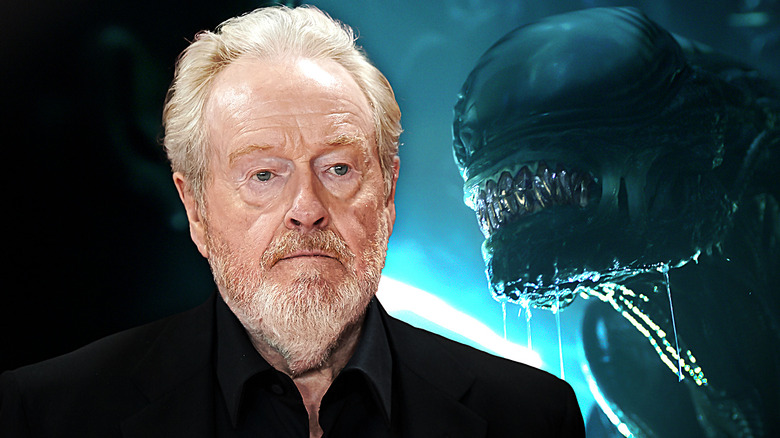Alien: Romulus Doesn't Ignore Ridley Scott's Controversial Prequels
Warning: spoilers for "Alien: Romulus" follow.
In 2012, Ridley Scott's "Prometheus" arrived in theaters. The sci-fi film was a big deal: it marked Scott's return to the "Alien" franchise for the first time since the original 1979 "Alien." This new entry was a prequel, jumping backward in the timeline and introducing new characters to the franchise. And in Scott's mind, it was just the beginning. Scott wasn't going to stop with just "Prometheus" — he wanted to make at least three or four movies to follow it. "The whole point of it is to explain the 'Alien' franchise and to explain the how and why of the creation of the Alien itself," the filmmaker said.
"Prometheus" was a huge hit. Critical and fan reaction was somewhat mixed, but the film hauled in $403.4 million at the box office. That meant a sequel was guaranteed, and in 2017, the Scott-directed "Prometheus" sequel "Alien: Covenant" arrived. Once again, Scott made it clear he wanted to keep things moving along. "Covenant" would be the start of a whole new trilogy! "I'm now going to the next one, which is the next evolution directly connected with the first one..." Scott said. "When that's finished there'll be another one and then another one which will gradually drive into the back entrance of the film in 1979."
Unfortunately, while "Prometheus" was a box office success, "Covenant" didn't fare as well. It made only $240.9 million, which was below expectations, and while Scott continued talking about making more movies in this prequel series, they never materialized. Now, the "Alien" franchise feels like it's rebooting itself with "Alien: Romulus." This entry is both a sequel and a prequel, set after the first "Alien" but before the events of the sequel "Aliens." The film is being sold as a kind of back-to-basics approach to the franchise, more in line with the original "Alien." That might make you think Scott's prequels, which don't have the best reputation (even though they're very good, actually!), would be completely ignored in "Romulus." But that's not the case.
Alien: Romulus acknowledges the prequels
In "Prometheus," we learn that human beings were created by towering god-like beings known as Engineers. After a map to a distant planet believed to be the home of these Engineers is discovered, an expedition is launched. The mission is funded by a mysterious elderly billionaire named Peter Weyland, and when the film begins, we're lead to believe Weyland is dead. Near the end of "Prometheus," however, we learn that Weyland, while very, very old, is still alive (and played by Guy Pearce wearing not-quite-convincing old age makeup). Weyland, who has one foot in the grave, wants to use the super-advanced technology of the Engineers to find a way to live forever. Unfortunately, the Engineers turn out to be huge jerks, and one of them ends up killing Weyland. R.I.P., sir, we hardly knew ye.
"Alien: Romulus" takes place in 2142, which is almost 50 years after the events of "Prometheus" and 20 years after the original"Alien" movie. In the film, a group of characters end up on an abandoned space station owned by the nefarious Weyland-Yutani Corporation. As that name implies, part of this company was once owned by the late Peter Weyland. The "Romulus" characters soon learn that the space station has been home to some science experiments involving the corpse of the Xenomorph from the original "Alien" film, which was recovered by Weyland-Yutani. It's here where "Romulus" finds a way to connect to Scott's prequels. As one character explains, using DNA from the Xenomorph, which in turns has connections to the Engineers, scientists were able to realize Peter Weyland's dream of finding a way to restore life to the dead (this is demonstrated by video footage of a dead, crushed mouse being brought back to life). They've harvested a type of alien goo that is now available in injectable form.
When this moment in the film happens, Benjamin Wallfisch's musical score directly quotes Marc Streitenfeld's main theme music from Ridley Scott's "Prometheus." Later in the film, we see a creepy human-alien hybrid birthed from when a pregnant character injects herself with the strange alien goo harvested by the scientists. While this creature isn't quite an Engineer, it does bear some visual similarities.
All in all, this is a simple but effective way to remind audiences that like it or not, Scott's prequel movies are still very much part of the "Alien" cannon, and narrative elements from those films are even directly contributing to the storyline of "Alien: Romulus."

